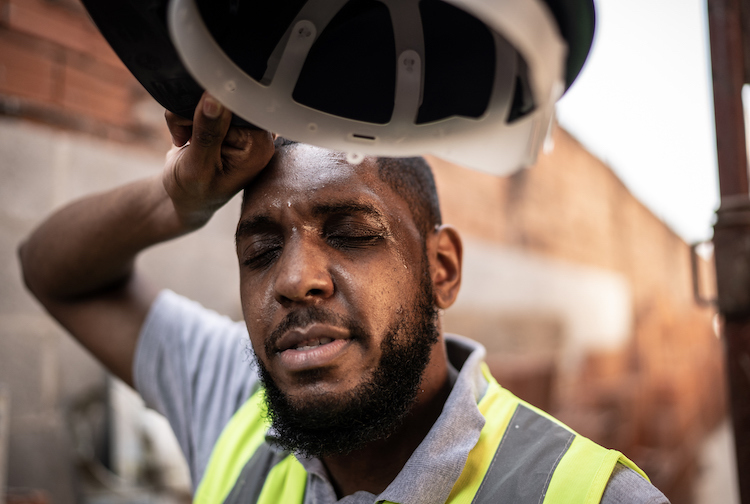
When to see a medical professional for heat-related illnesses
The head of VCU Health Tappahannock Hospital’s emergency department shares tips on how to stay cool when the weather heats up.
July 19, 2023 When the heat index is 100 degrees or higher, health experts recommend limiting outdoor activities. (Getty Images)
When the heat index is 100 degrees or higher, health experts recommend limiting outdoor activities. (Getty Images)
By Sara McCloskey
High temperatures cause hundreds of deaths every year and send many to the hospital because of preventable heat-related illnesses.
According to the Centers for Disease Control and Prevention, there are about 702 heat-related deaths in the United States each year, with heat-related illnesses hospitalizing about 9,235 people.
“In hot weather, your body cools itself primarily by sweating. The evaporation of your sweat regulates your body temperature. When the humidity is high, the air is already nearly full of water vapor and it is difficult for sweat to evaporate into the air, which leads to your body over-heating,” said Lisa Dodd, D.O., medical director of the Emergency Department at VCU Health Tappahannock Hospital.
Tappahannock Hospital is one of several facilities within the VCU Health System, providing care for Virginians in rural, Northern Neck communities. VCU Health News spoke with Dodd to find out how to stay cool and safe when the weather heats up.
What are the signs and symptoms of the most common heat-related illnesses treated in the emergency department at VCU Health Tappahannock Hospital?
There are several types of heat-related illnesses. The most common type I see in the emergency department is heat exhaustion, which is the body’s response to an excessive loss of water and salt, usually through excessive sweating. Patients with heat exhaustion also tend to experience headaches, nausea, dizziness, weakness, increased body temperature, among other symptoms.
The most serious heat-related illness is heat stroke. This happens when a person's body temperature rapidly increases — usually to 106 degrees Fahrenheit or higher within 10 to 15 minutes — and it's unable to cool down by sweating. Other symptoms include confusion, slurred speed, loss of consciousness, seizures, and either hot / dry skin or profuse sweating. If someone does not receive or delays emergency treatment, heat stroke can cause permanent disability or death.
Who are the most vulnerable people to heat-related illnesses?
Anyone can be affected by the heat. Some of the more vulnerable people include those who are pregnant, people with heart or lung conditions, young children, older adults, athletes or outdoor workers.
There are also some areas in communities more vulnerable to high temperatures. “Urban heat islands” are described by VCU researchers as locations in cities or urban spaces where large buildings or neighborhoods without trees or greenspace create pockets that are hotter than other parts of the city. The people who live in these areas are more vulnerable to heat-related illnesses.
What should I do if I start to feel sick in the heat?
The first thing you should do is remove yourself from the heat. Go to a cool place, rest and drink cool fluids — primarily water and sports drinks. Be sure to loosen or remove clothing. You can also use cooling measures sure as taking a cold shower or bath, sitting in front of a fan, or putting towels soaked in cool water on your skin, specifically under the armpit, neck or groin.
At what point should I call my primary care physician? When should I go straight to urgent care or the emergency room?
Your primary care physician is there to answer any basic questions, give advice or help you manage mild symptoms such as rash, headache and mild nausea.
Urgent care is the place to go when you have mild to moderate symptoms that are not improving. These symptoms include a rash, headache, nausea, dizziness and/or a mild excess sweating that haven’t improved after about an hour.
The emergency department is where you should go if you are experiencing more severe symptoms. This includes excess or lack of sweating, increased body temperature reaching 103 degrees Fahrenheit or above, lack of urination, cannot hold any fluids down, weakness, irritability, any alteration of mental status or loss of consciousness.
What does treatment look like for those experiencing heat-related illnesses?
When someone comes in for treatment because of a heat-related illness, medical team members will check their vital signs, including temperature. They will typically be given cool liquids to drink. If they are unable to keep liquids down, they will be given fluids and medicine through an IV. Cool towels will also be placed on their skin.
If symptoms continue or they become more severe, additional testing may be needed including lab work, computerized tomography (CT) scans and X-rays.
How can I prevent my body from overheating when it’s hot outside?
Summers in Virginia can be hot and humid. There are many things you can do to beat the heat when at home or out-and-about.
- Keep your body hydrated: Drinking water every day is good for your overall health. Stay hydrated and regulate your body temperature by drinking plenty of fluids. Water provides you with the proper fuel to get you through a busy day outside. Even mild dehydration can affect you mentally and physically, but it can be easily avoided with infused water or by setting reminders to hydrate regularly.
- Schedule activities carefully: On days where the heat index is 100 degrees or higher, health experts recommend limiting outdoor activities and staying in air conditioning instead.
- Slow down: If you are not used to exercising or moving around a lot in the heat, pace yourself. Start off slow and slowly build your pace throughout the day. Also, take frequent breaks for water and to cool off.
- Find shade: Use a tree, umbrella or other cool shelter to keep your body from overheating. For the most protection, wear a hat and sunglasses.
- Use sunscreen: Sunburn affects your body’s ability to cool down. Use broad spectrum sunscreen that blocks both UVA and UVB rays and has an SPF of 15 or higher. Reapply throughout the day as directed and after swimming, sweating, or toweling off.
- Stay cool indoors: On days when it’s too hot to go outside, stay inside with the air conditioning. If your home does not have AC, try to find a public area or local cooling shelter to spend some time. Health experts note that electric fans will not prevent heat-related illnesses when the temperature is in the high 90s. Taking a cool shower or bath and limiting how much you use your stove and oven may help cool you and your home.
Remember: the temperatures inside vehicles can rise very quickly and to dangerous levels during the summer. Do not leave kids, older adults or pets in a parked car — even with the windows open — as this can be deadly.



